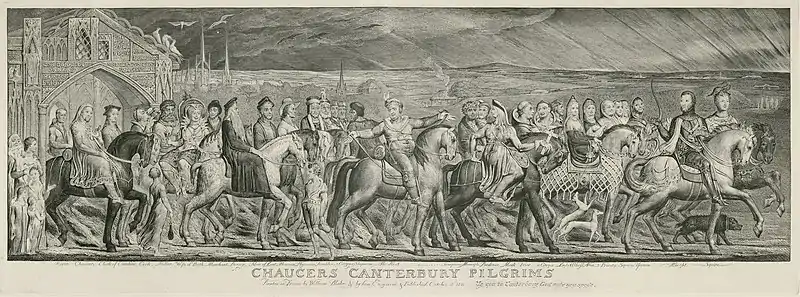The Host (Canterbury Tales)
The Host (Harry Bailly or Harry Bailey) is a character who plays a key role in and throughout Geoffrey Chaucer's The Canterbury Tales. He is the owner of the Tabard Inn in London, where the pilgrimage begins and he agrees to travel on the pilgrimage, and promises to judge both the tales the pilgrims tell, and disputes among the pilgrims. [1][2][3][4][5][6][7][8] He discusses his marriage to his absent wife, Goodelief, when commenting on The Tale of Melibee with its message of patience . The Host says Goodelief is herself extremely impatient and speedy in urging him to violent revenge. Her name Goodelief may be a real name or just meaning, perhaps ironically, good dear one.[9]

William Blake's The Canterbury Pilgrims with The Host in the middle
References
- Richardson, C. C. (1970). The Function of the Host in The Canterbury Tales. Texas Studies in Literature and Language, 12(3), 325-344.
- Williams, T. (2008). The Host, His Wife, and Their Communities in the" Canterbury Tales". The Chaucer Review, 42(4), 383-408.
- Page, B. (1969). Concerning the Host. The Chaucer Review, 1-13.
- Shutters, L. (2020). The Host, the Man of Law's Tale, and the Fantasy of the Foreign Wife. The Chaucer Review, 55(4), 397-421.
- Jungman, R. E. (1976). The Pardoner's Quarrel with the Host. Philological Quarterly, 55(2), 279.
- Pichaske, D. R., & Sweetland, L. (1977). Chaucer on the Medieval Monarchy: Harry Bailly in the" Canterbury Tales". The Chaucer Review, 179-200.
- Glasser, M. (1983). The Pardoner and the Host: Chaucer's Analysis of the Canterbury Game. CEA Critic, 46(1/2), 37-45.
- Gray,Douglas (2003) The Oxford Companion to Chaucer Entry on Host, The, Oxford University Press
- Gray,Douglas (2003) The Oxford Companion to Chaucer Entry on Goodelief, Oxford University Press
This article is issued from Wikipedia. The text is licensed under Creative Commons - Attribution - Sharealike. Additional terms may apply for the media files.